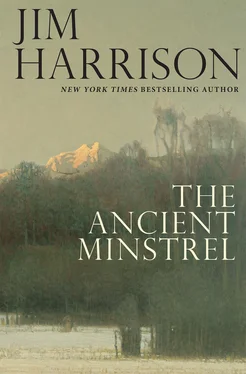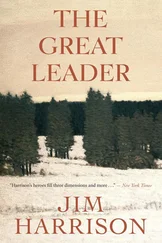One very warm July day he got up at dawn to take advantage of the cool air that wasn’t there. He swore to finally put an AC unit in his studio. He had an odd sense of foreboding having experienced a few minutes of minstrels in his dreams. He went out to feed Darling and Marjorie and discovered Darling to be dead and Marjorie quite ill. His wife was having coffee in her robe on the front porch. He hollered strongly and she came halfway down with Mary in alarm.
“Call the county agent. Darling’s dead and Marjorie’s sick.”
She ran to the house while Mary entered the pen, sniffed, and shied away from Darling, then licked Marjorie’s ears. They had lately become ardent playmates. Marjorie’s eyes fluttered and he was relieved she wasn’t dead. Naturally he wept, the mother of good things was dead.
The county agent, Winfield, got there in an hour. He knew him fairly well and at first he misunderstood his gruff, laconic nature though there was always a twinkle in his eye. He asked to see the feed, ran it through a hand, staring at it closely.
“It’s mycotoxins, badly moldy grain. It’s my fifth case with fatalities. I warned the grain elevator to alert their customers. They must have forgotten you.”
“Why didn’t Marjorie die?”
“I don’t know. She probably didn’t eat much or she’d be gone too.”
A small lightbulb went off and he said that on their morning walks Marjorie dug and rooted a lot in an old garden spot. Recently she had demolished a whole row of turnips and several rutabagas and now was working on horseradish root. He said he’d tried to stop her, thinking that horseradish root would be too hot and spicy.
“Pigs don’t give a shit,” Winfield said. “You could pour a whole bottle of horseradish on a ham from their mother and they’d eat it.”
He was mystified when Winfield knelt and closely examined Marjorie. “She’s sick but she’ll pull through. Give her a couple of quarts of milk.” Mary growled at Winfield as if he might be hurting Marjorie.
“They think they’re in love,” he explained, a little embarrassed by Mary’s behavior.
“I know an old baloney bull who made friends with a barn cat. They hung out together all day. The cat sleeps on the bull’s back and sometimes just rides around. If we got close to this bull or his cat friend we’d get our asses kicked.”
He called Zack who brought over his big backhoe and buried Darling fairly close to her daughter Alice. His heart ached when Zack dragged her over the lip of the hole and she made a mighty thump when she landed at the bottom. Zack had a few dairy cows and brought over a half gallon of milk for Marjorie. She drank hungrily sharing some with Mary. He was charmed watching the lovers drink together, their heads touching.
Zack had a pint of whiskey in his coat and they sat on the studio steps looking at the raw grave drinking the whiskey straight from the bottle. It was cheap and made them cough but then some think raw booze is a pleasure. His old Finnish friend in the Upper Peninsula thought that any sort of mixer was a waste of time.
Breathing in and out is problematic in marriage. The early surge of ardent love wanes and flags. They had had a fairly low period after he taught at Stony Brook on Long Island. His wife didn’t care for it there, lonesome for a couple of horses she had stashed in Michigan. She had recurrent nightmares of sheep in burning boxcars. There was also the idea that on Long Island they would be trapped in case of nuclear attack. This was at the height of the Cold War and Long Island also began to further his claustrophobia, a lifelong infirmity. The screenplay work was thin, but a boon happened when he received a grant of a year’s living expenses from the National Endowment for the Arts. When they’d spent the last of that money in Key West, they returned home to a letter at the post office saying he had won a Guggenheim Fellowship. He had been promoted in his absence at Stony Brook but his wife didn’t want to return to Long Island which she saw as unspeakably dense and overdeveloped. And he was fatigued with being a college poet and living up to the cliché of being a drunk and a womanizer. He did a good job at it but it was relentlessly phony.
So they stayed in northern Michigan at the time on their little farm for which a friend had loaned them the down payment. The farm was nineteen thousand and the mortgage was only $99 a month. Still it was a struggle. At the time he received only five thousand dollars for a novel which didn’t work. He did some informal sports and outdoor pieces for Sports Illustrated and other magazines. It was hard to get enough money together to get a drink. They went insecurely from month to month in a very nearly squalid condition. He did eventually have to return to teaching but the objective was to put it off as long as possible, preferably forever. The good parts were a fine garden spot and a big barn on the property. He loved the barn because it reminded him of his not so idyllic youth. They boarded three huge draft horses and two saddle quarter horses for some extra income. One of the draft horses was the Midwest’s largest, a mare named Sally who weighed twenty-six hundred pounds. She was like having a grand painting out the kitchen window in the back pasture. He took to wearing bib overalls like an actual farmer. Later they began referring to their penury at the time as “the macaroni years.” He had forbidden her to accept any money from her parents though they were ready and willing to help.
In his writing downtime fooling with the pigs he had evolved a theory, not ready for release, he called a “glimpse.” The word was not quite right but would have to serve for the time being. In short it was typified by the way reality can break open and reveal its essence like bending linoleum until it broke and then you saw the black fiber underlying it. Standing on the bridge at Niagara Falls tempted by suicide was such a moment. Or holding Alice’s little dead body before burial. In both he had seen altogether too poignantly the sweep of life. Death gets your attention. He felt a little of it riding in a friend’s Ferrari going 160 miles per hour on a freeway. That however didn’t make his definition. It was too contrived and foolish. Once in a bar in Key West he was sitting at the end of the bar when two quarreling Cubans pulled pistols. He dropped to his knees silently, crawling through the kitchen and out the back door where he hid in a hedge smoking for a half hour. He would always remember what the bartender said when he went back in: “Ramon was pissed. He said he would kill him and by golly I bet he will.”
His father had some Mennonite second cousins he liked and his family stopped to visit them now and then when they drove south in Michigan. This group of Mennonites lived on big farms near Ithaca. He was fascinated with these people knowing that they didn’t drink, smoke, dance, listen to radio, or have a TV. They almost never showed any sexuality except in sort of an underneath way. He was about twelve at the time and was just beginning to feel his first strong hormones. Every time they stopped by he felt sweet on a girl named Ruth about his age. She was so demure and shy it was next to impossible to get her to say anything. She wore a long gray dress and her little black skullcap which was obligatory. One afternoon she approached the driver’s side of their parked car where he was sitting and listening to the Detroit Tigers play the Yankees on the radio. She drew quite close considering it was against the rules for her to listen to a radio. In an act of uncommon bravery he reached out the window and took her hand. She was startled but she didn’t withdraw her hand which felt oddly strong for a girl’s. She let her hand go limp.
Читать дальше












